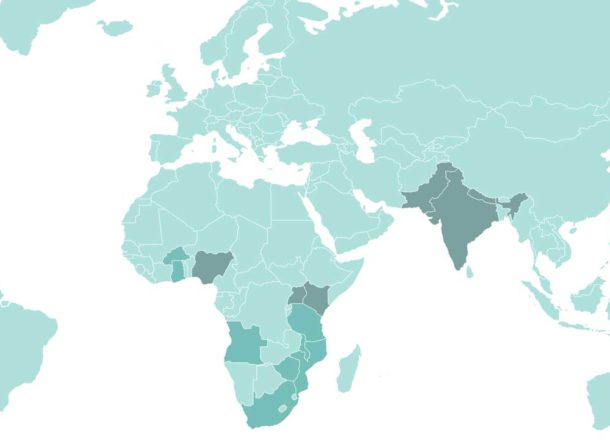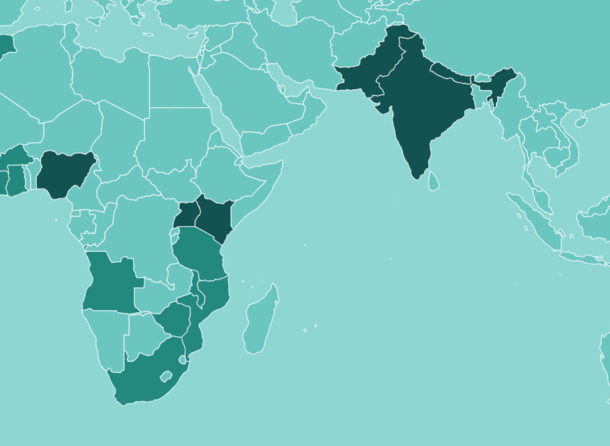
Understanding affordable housing markets through data
At least 1.2 billion people worldwide live in substandard housing, often lacking access to basic services and infrastructure. This challenge is especially acute in South Asia and sub-Saharan Africa, with cumulative housing shortages of at least 80 million and 60 million homes, respectively. With urban population growth accelerating in both regions, this endemic lack of affordable housing is constraining inclusive economic growth, and limiting the opportunities to build mitigation and resilience solutions into cities that are on the frontline of the climate crisis.
It is estimated that $17 trillion of investment is needed to solve the global housing deficit, representing a huge untapped market.
Delivering quality, serviced, and genuinely affordable housing at scale in Africa and Asia has the potential to achieve transformative positive impacts on the lives of billions of people at the lower end of the income pyramid. Yet this level of investment will only be enabled where there is accessible market intelligence to facilitate risk-taking and decision-making. In parallel, this must exist alongside amenable policy environments and effective regulation, informed by data, that works to encourage lending into the sector.
With this purpose, the Centre for Affordable Housing Finance in Africa (CAHF), and Reall, an innovator and investor in affordable housing, have worked with the data consultancy 71point4, to create a database of Market Shaping Indicators (MSIs) to track affordable housing markets. 115 indicators were agreed on which collect data from across the housing value chain and were populated across nice countries in Africa.
Reall has since expanded their application to Asia, working with Impetus Advisory Group (IAG) and Jana Urban Services for Transformation (JUST) to populate the MSIs in Pakistan and India respectively.
The production of good data is more than just a numbers exercise.
In recent years governments in emerging economies have increasingly highlighted the need for affordable housing within national policy. In 2018 the government of Kenya recognised the centrality of affordable housing to national development, designating it as one of a “Big Four”‘ set of policy priorities, with the aim to facilitate the construction of 500,000 new affordable homes by 2022. In the same year the government of Pakistan committed to facilitate the construction of millions of low-income housing units through the Naya Pakistan Housing Programme, as a key electoral pledge. Yet despite the clear political will, delivery of affordable housing at scale is constrained by supply and demand side challenges. Affordable housing markets across Africa and Asia continually face blockages in the form of lack of affordable urban land, weak regulatory environments, inflated construction costs, and limited finance for developers and homeowners.
Market intelligence is fundamental to addressing these barriers.
By collecting data from across the housing value chain and publishing all indicators on our cutting edge open source Data Dashboard, Reall enables market actors to easily access national, regional and even city wide data for affordable housing markets in one place. Each indicator is also presented with a quality scoring, methodology and original data source attached so that users can quickly assess the relevance and reliability of each data point within the market.
Separated into seven sections (Land and Infrastructure; Construction and Investment; Sales and Rental; Maintenance and Management; Enabling Environment; Economic Environment; Demand) the work brings together the broad spectrum of factors that contribute to flourishing housing markets. In this way different market stakeholders, from those involved in the rental markets, to land acquisition, to mortgage finance, are able to access the relevant market intelligence and weight its credibility for use in investment and policy-based decision making.
Building synergy across the housing market data ecosystem
Across Africa and Asia there is a considerable data deficit. All institutions in a country’s housing value chain generate data, however the bulk of this is not publicly available, even when collected by public institutions. Accessibility to public data is often challenging and only reached through sophisticated online portals or found buried within lengthy paper reports. This combination of limited availability and accessibility constrains the market and limits investment. The Market Shaping Indicators seek to solve this with many indicators containing data that have either never been made publicly available before, or that are difficult and time consuming to locate.
Where indicators were unable to be populated, the data gaps themselves create a useful proxy to measure the extent to which each country’s government prioritises affordable housing. By working with data holders to improve accessibility and quality, this work is not only ensuring that other market actors are able to access better data, but also that public sector bodies are themselves looking more closely at the housing markets in their countries. In identifying and then disseminating available data, this work will in turn encourage the provision of additional data where information gaps exist.
A Data Agenda for Housing
The Market Shaping Indicator work is just the start of a wider Data Agenda for affordable housing markets. While the MSIs gather information largely from public sector data holders, CAHF and Reall are working with Financial Sector Deepening (FSD) to examine how data generated from private sector participants, including developers, real estate agents and finance providers, can be collected without undermining market competitiveness.
The Data Agenda for Housing seeks to curate and collate existing data, whether collected by the private, public or NGO sectors, in the normal course of business, or explicitly for unique purposes, and share this into the public domain in support of overall market development.
By improving the efficiency of the investment, the process lowers barriers to entry by other parties and enables them to see opportunities to engage in affordable housing. All of this together creates a basis for scale needed to solve the housing deficit.
Visit our Market Shaping Indicators and explore the data on Reall’s Data Dashboard: https://reall.net/msi/
Read more stories

Reall Academics Published in Prestigious Journal
View the article here. A peer-reviewed academic paper written by Dr Andrew Jones and Dr Lisa Stead from Reall’s Evidence Team has been published and prominently featured in the latest issue of the journal Environment & Urbanization. This is is …

Reall pioneers the first open source data dashboard for affordable housing in Africa and Asia
Visit our data dashboard>>> Reall is a pioneer and innovator with over 30 years’ experience in the affordable housing sector. In April 2020, Reall launches an innovative data dashboard which geographically locates and evidences the impact of affordable housing by …

Reall show how affordable housing can tackle the challenges of urbanisation
On World Habitat Day, Reall join international organisations to address the urgent need for housing for all. Hear from Reall’s Sima, as she describes the explosive urban growth coming and explains how Reall are showcasing the cross-cutting benefits of affordable …


